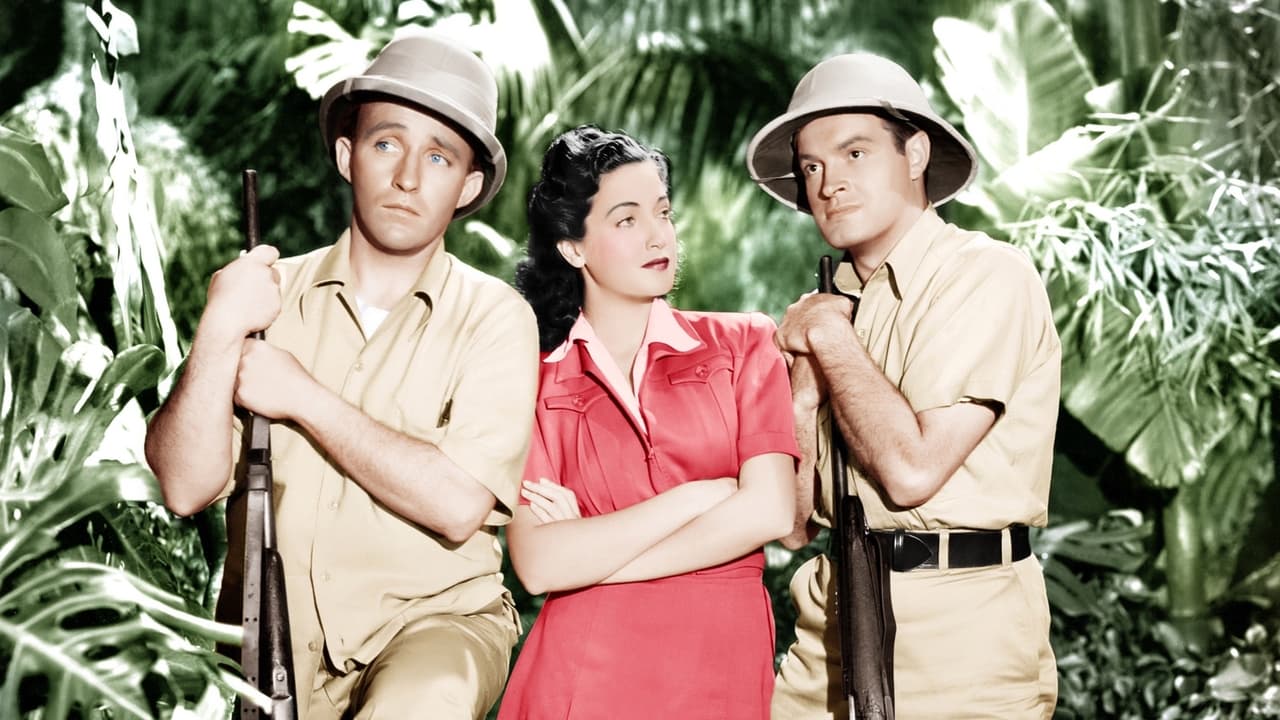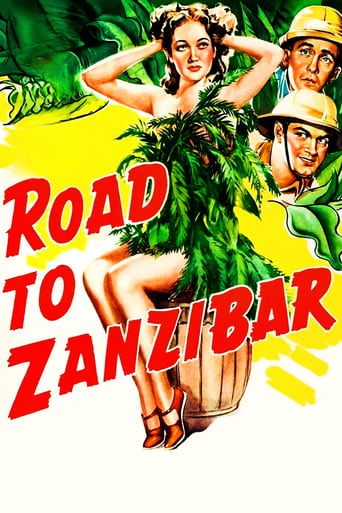Laikals
The greatest movie ever made..!
Neive Bellamy
Excellent and certainly provocative... If nothing else, the film is a real conversation starter.
Roy Hart
If you're interested in the topic at hand, you should just watch it and judge yourself because the reviews have gone very biased by people that didn't even watch it and just hate (or love) the creator. I liked it, it was well written, narrated, and directed and it was about a topic that interests me.
Fleur
Actress is magnificent and exudes a hypnotic screen presence in this affecting drama.
weezeralfalfa
If you like the other films in the "Road Series", you will probably like this one too. The plot is thoroughly ridiculous, of course, more so than the others, I would say. But the mayhem and occasional songs are much more important than the very flimsy plot of this farce. The screenplay can be usefully divided into several segments, the first of which finds the boys(Bob Hope and Bing Crosby) associated with a circus(in equatorial Africa?). Bing is the barker and Bob is the performer of various very daring stunts. Bob has had it when Bing suggests he wrestle a giant octopus. Unfortunately, their pyromania burns down the Big Top, sending them running for cover. Thus begins the second segment when they buy the worthless deed to a gold mine, then unload it on another. Next, they get involved with two footloose women who con them out of some money buying the freedom of one, supposedly being sold as a slave. These two women(Dorothy Lamour and Una Merkel) will be involved with them for most of the rest of the film. They get the boys to agree to finance a safari into darkest Africa, not telling them that actually they are heading for Dorothy's wealthy boyfriend. When they discover that they are being used, they quit the safari and head back. The next segment mainly has them interacting with a huge population of natives, who debate whether they are gods or scoundrels, fit to be boiled in their huge cauldron. The final, all too brief, segment has the boys and girls reunited, apparently where they began the Safari, anxious to return home, but in need of money to purchase two more tickets for the 4 of them.There is a huge gap in the story where the boys somehow escape from being boiled alive and make it back to safety. At the same time, somehow the girls make it back to the same spot, lacking any money to pay the porters and other workers of the safari. I understand that the desired run time was being approached, and a quick ending was needed.One of the more hilarious scenes is when Bob is made to wrestle a supposed gorilla as a test of whether the boys might be gods. The circus tent fire looked realistic, with people and circus animals running around screaming.Incidentally, Zanzibar is a group of small islands off the coast of Tanzania. I never had the impression that we were there. Oh well, the boys never made it as far as Singapore in "The Roald to Singapore".
lugonian
ROAD TO ZANZIBAR (Paramount, 1941), directed by Victor Schertzinger, reunites director with his ROAD TO SINGAPORE (1940) players, Bing Crosby, Dorothy Lamour and Bob Hope. While this edition could very well have been a rehash from their initial teaming or a continuation to where the previous film left off, this second installment, having its major stars assuming new character roles, has not only become a sequel in name only but a much funnier outing by ways of jokes and incidents revolving around Hope and Crosby. Hardly resembling ROAD TO SINGAPORE by any means, ZANZIBAR can easily be categorized as the official opener to what has become relatively known as the "Road Pictures." The plot revolves around boyhood pals Chuck Reardon (Bing Crosby) and Hubert "Fearless" Frazier (Bob Hope), working in a carnival where Chuck is a smooth talking con man and "Fearless" the daredevil who gets shot out of a cannon flying through a hoop of fire at a distance. Using a dummy in Frazier's place (is there a difference?), the act comes to a halt when the dummy obtains the fire, lands on one of the tents, and burns down the carnival, causing our heroes to make a run for it. Traveling on the road to Mugabund, Kipungo and Molanda, Frazier, after five years of traveling with his pal through sideshow acts, wants to break with the act and return home to Birch Falls. There's one thing standing in his way, and that's Chuck. Having paid Charles Kimball (Eric Blore) $5,000 of his pals savings for the map leading to a diamond mine, it is discovered the map is worthless. Fearless decides to get his money back by passing the map over to Le Bec (Lionel Royce). Discovering he's been tricked, Le Bec and his henchman (Buck Woods) go after them, forcing our heroes to make another run for it, this time on a boat to Zanzibar. While there, Chuck and Fearless meet up with Julia Quimby (Una Merkel), a woman in distress who asks the boys for money to rescue her abducted friend, Donna Latour (Dorothy Lamour) from a slave auction. With all that done, the boys further assist the girls by teaming up in a safari to help Donna locate her long lost brother, who, in actuality is only using the boys to help her meet with J. Theodore Brady, a millionaire whom she plans to marry. Realizing they've been tricked by a couple of American showgirls from Brooklyn, Chuck and Fearless break away from them, getting themselves lost in the jungle and ending up in the middle of a hostile native tribe. Paging Tarzan! In spite of Dorothy Lamour now being part of the Hope and Crosby teaming, her scenes, though prominent, are actually secondary. While her character as well as Merkel's appears mid-way to limited results before disappearing during another long stretch before reappearing, the film overall belongs to Hope and Crosby from start to finish. Song numbers are at a minimum this time around, with new songs by James Van Husen and Johnny Burke, including: "You Lucky People You" (sung by Bing Crosby during opening titles and story introduction); "African Etude" (sung by natives chanting "Ba-toom-bomba"); "The Road to Zanzibar" (sung by Crosby); "You're Dangerous" (sung by Dorothy Lamour); and "It's Always You" (sung by Crosby). Interestingly, Hope doesn't get to sing any songs this time around. Although some sources credit "Birds of a Feather" to have been scored for the film, this, along with a cameo by Leo Gorcey, do not appear in circulating prints.With Hope supplying much to the comedy and one-liners, Crosby also demonstrates his flare for comedy as well. Aside from their their traditional "paddy cake" routine, other highlights include Hope's wrestling with a gorilla (guess who wins), and their encounter with natives (with subtitles translating to what they're saying). Others in the cast include Douglass Dumbrille (The Slave Trader); Joan Marsh (Dimples); and Luis Alberni, Paul Porcasi and Leigh Whipper in smaller roles.In spite of its fine slapstick and gags keeping the story moving at a brisk pace, ROAD TO ZANZIBAR, has become one of seven "Road" movies not be as well known or revived as the others, namely SINGAPORE (1940), MOROCCO (1942) and UTOPIA (1946). ZANZIBAR, along with the others in the series, have been readily available on home video and DVD, along with occasional cable TV broadcasts on American Movie Classics (1995-2000) and Turner Classic Movies(2005-2006, 2010-present). As a satire on jungle movies, ROAD TO ZANZIBAR is as good as it gets, you lucky people you. Next installment: ROAD TO MOROCCO (1942), hailed by many to be the wildest and funniest yet. (***)
MartinHafer
It's funny, but after seeing ROAD TO ZANZIBAR and ROAD TO MOROCCO in the same night, I have a hard time remembering any of the gags in ZANZIBAR. It's not that it's a bad movie, it certainly isn't, but it also isn't as refined and memorable as the next (3rd) installment in the "Road" series.Starting with this film, Hope and Crosby begin treating each other a lot worse and this dog eat dog style of humor worked well. A great example is when the film begins we find that Crosby has convinced Hope to become "Fearless Frazier"--a daredevil who is always risking his life in a variety of schemes thought up by Crosby.Although the film begins in the States, it somehow manages to end up in Africa--with all the usual expected clichés and fun. Not surprisingly, they find cannibals and a gorilla (who is the usual "guy in a gorilla suit"--something seen in practically every jungle picture of the era). And, even less surprisingly, we find Dorothy Lamour (along with her pal, played by screen veteran Una Merkel) in Africa--falling for you-know-who! While none of this is fantastic or inspired, the film is very pleasant and fun. The only serious negative is that there are too many songs, plus none are particularly memorable. A decent follow-up to ROAD TO SINGAPORE, though not one of the very best of the series.
writers_reign
As it turned out this was the second in a franchise that no one thought of as a franchise at the time. Hope and Crosby had been teamed with Dorothy Lamour in what was intended as a one-off, Road To Singapore, and when Fred McMurray and George Burns passed on this someone remembered that Road To Singapore had made a little noise at the box office so why not team Hope and Crosby again and throw a 'road' into the title to remind fickle audiences of Singapore. Things were beginning to fall into place but we weren't there yet; Hope and Crosby were now established as performers with Crosby as the pitch man and Hope performing the life-threatening stunts and what, in retrospect, turned out to be the main ingredient - the songs - was also in place. With Fred and Ginger no longer a team at RKO someone at Paramount clearly figured there was a gap in the market and you can almost hear the thinking ...'what if, they weren't two DANCERS, but two SINGERS, then we add an extra 'girl' to the mix as a foil for Hope, Helen Broderick is working so why not Una Merkel, she did all right in Destry Rides Again opposite Micha Auer...' Actually the foursome worked quite well but it's the threesome we remember from the rest of the franchise (excluding the last, Hong Kong). We were also becoming used to the kind of jokes that let the audience in - the native chief tells Hope he will be fed to a giant bird which gives Crosby a chance to say 'this time the bird gets you'. If there are not too many lines as on the money as that the one thing that endures is the songs; on Singapore Johnny Burke was teamed with Jimmy Monaco but he'd now formed a partnership with Jimmy Van Heusen that would last throughout the forties and into the fifties and during that time they wrote not only all the other 'Road' pictures but also about 95 per cent of Crosby musicals. They started well here with three fine numbers, You Lucky People You (if you ever wondered where cockney comedian Tommy Trinder got his catch phrase from look no further), You're Dangerous, and the standout ballad It's Always You, plus the almost obligatory title number and it is these songs that will endure even if the films themselves tend to date.

